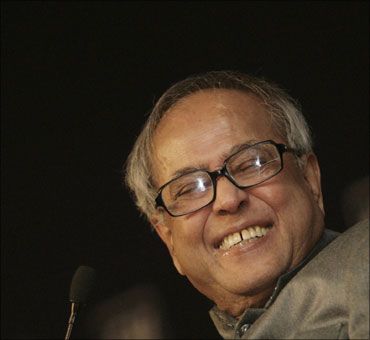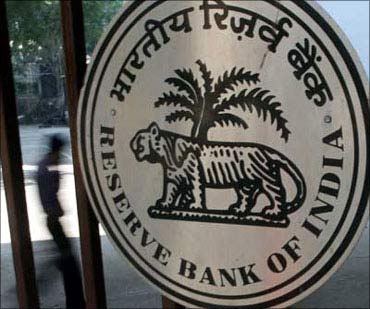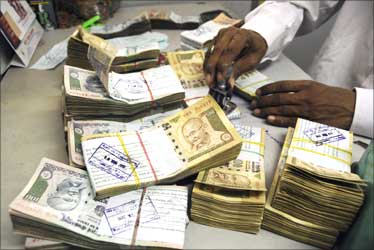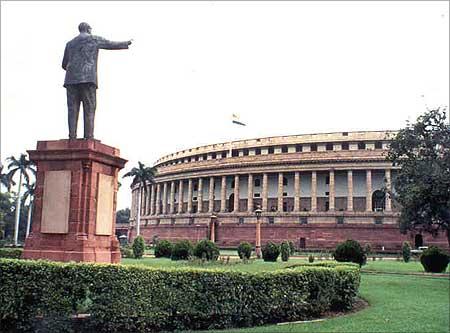 | « Back to article | Print this article |
Whose Budget is it, anyway?
Should the finance secretary always be the senior-most among all the secretaries in the finance ministry or the one who heads the economic affairs department?
This seems to be the liveliest of all current debates among senior officers in North Block, where the finance ministry is headquartered.
It is not difficult to guess why the debate is taking place now, at perhaps the most inappropriate time of the year with less than four weeks to go before the finance minister presents his Budget for 2011-12.
For, rarely does the government allow a finance secretary to demit office with so little time left before the Budget is finalised.
Finance Secretary Ashok Chawla retired on Sunday.
Click NEXT to read further. . .
Whose Budget is it, anyway?
Finance Minister Pranab Mukherjee chose not to grant him an extension until at least the Budget exercise was over.
Giving Chawla an extension for a couple of months would have been an easy decision, endorsed by a convention that most of Mukherjee's predecessors followed. However, Mukherjee is not a stickler for convention.
Last year, too, he chose to deviate from convention by not granting his revenue secretary, P V Bhide, an extension for a couple of months to let him see the Budget passed in Parliament in May 2010.
North Block veterans, of course, point out that changing secretaries just before or after the Budget is not a practice on which anyone should frown.
If Rajiv Gandhi could change his finance minister a little more than a month before the Budget, what is so sacrosanct about changing a finance secretary four weeks before the Budget, they argue.
Click NEXT to read further. . .
Whose Budget is it, anyway?
Using the same principle, perhaps, Mukherjee let Chawla retire on Sunday, paving the way for the installation of the Union government's first woman finance secretary in Sushama Nath.
The debate, however, is not on whether Nath should be the finance secretary.
Few bureaucrats will disagree on the impeccable performance record of the IAS officer from Madhya Pradesh cadre and the high integrity in the manner in which she dealt with difficult proposals all these years.
There is also the inevitable, but not always desirable, political correctness in having a woman at the helm of the finance ministry, something that other ministries like the external affairs ministry have already achieved.
The question that is being posed is that even if Nath is a competent, bright officer capable of being the country's first woman finance secretary, can she perform the role of the finance secretary as effectively as she would like to if she continues to head the department of expenditure?
Click NEXT to read further. . .
Whose Budget is it, anyway?
The Union Budget is undoubtedly the finance ministry's most important annual exercise.
A finance secretary usually shows and establishes her leadership of the finance ministry when the Budget is being formulated.
The Budget Division, which does the bulk of the Budget-related work, works under the department of economic affairs.
Yes, the expenditure department head, in her capacity as finance secretary, will oversee all that, but the key ownership of that exercise rests with the department of economic affairs and its secretary.
Thus, there have been finance secretaries in charge of departments other than the economic affairs department, but in matters pertaining to the Budget, the person heading the economic affairs department has often overshadowed the finance secretary who may be heading some other department.
A few examples here would be useful to illustrate the point.
Click NEXT to read further. . .
Whose Budget is it, anyway?
A few months after Manmohan Singh entered North Block in 1991 as finance minister, he replaced his finance secretary, S P Shukla, who then was heading the economic affairs department.
He brought in Montek Singh Ahluwalia, commerce secretary at that time, as the secretary in charge of the economic affairs department.
However, he conferred the finance secretary's designation on K P Geethakrishnan, who was then in charge of the expenditure department, using the principle of seniority.
Now, among the secretaries at that time, who would you associate the path-breaking Budget of 1992 with? Geethakrishnan or Ahluwalia?
Even though Geethakrishnan was the finance secretary, Ahluwalia built greater ownership of that Budget simply because he was in charge of the economic affairs department.
That is precisely what happened to Piyush Mankad, who was in charge of the revenue department, but became the finance secretary because of his seniority when Yashwant Sinha was the finance minister.
Click NEXT to read further. . .
Whose Budget is it, anyway?
However, in the area of Budget-making, Sinha's economic affairs secretary, E A S Sarma, and later C M Vasudev, had more influential roles.
Indeed, Jaswant Singh managed to present a Budget without even having a formally designated finance secretary, because he felt his economic affairs secretary was competent to handle the Budget and he saw no need to upset him by making the senior-most secretary in charge of another department hold that prestigious designation.
Earlier, Manmohan Singh and R N Malhotra, both of whom went on to become Reserve Bank of India governors, made their impact on the Budget as economic affairs secretaries, since other secretaries senior to them became finance secretary.
Nobody recalls who these finance secretaries were.
The challenge for Nath, therefore, is to make herself more effective as finance secretary even though she will have to contend with a new economic affairs secretary.
If precedent is anything to go by, she has a tough task ahead.






